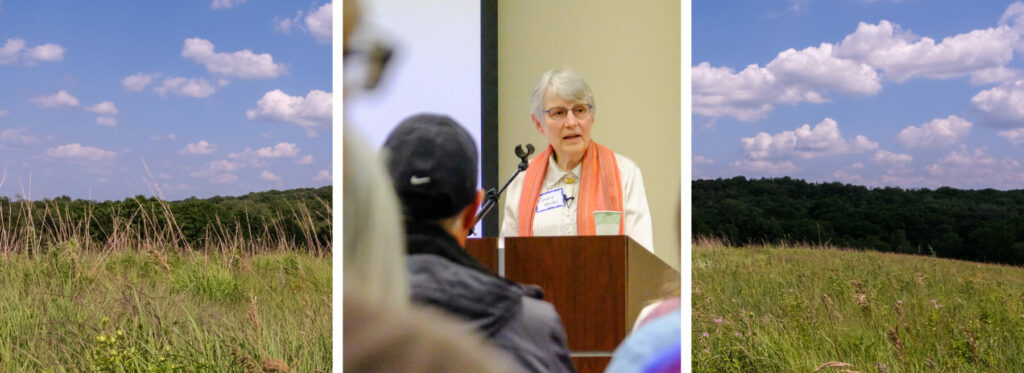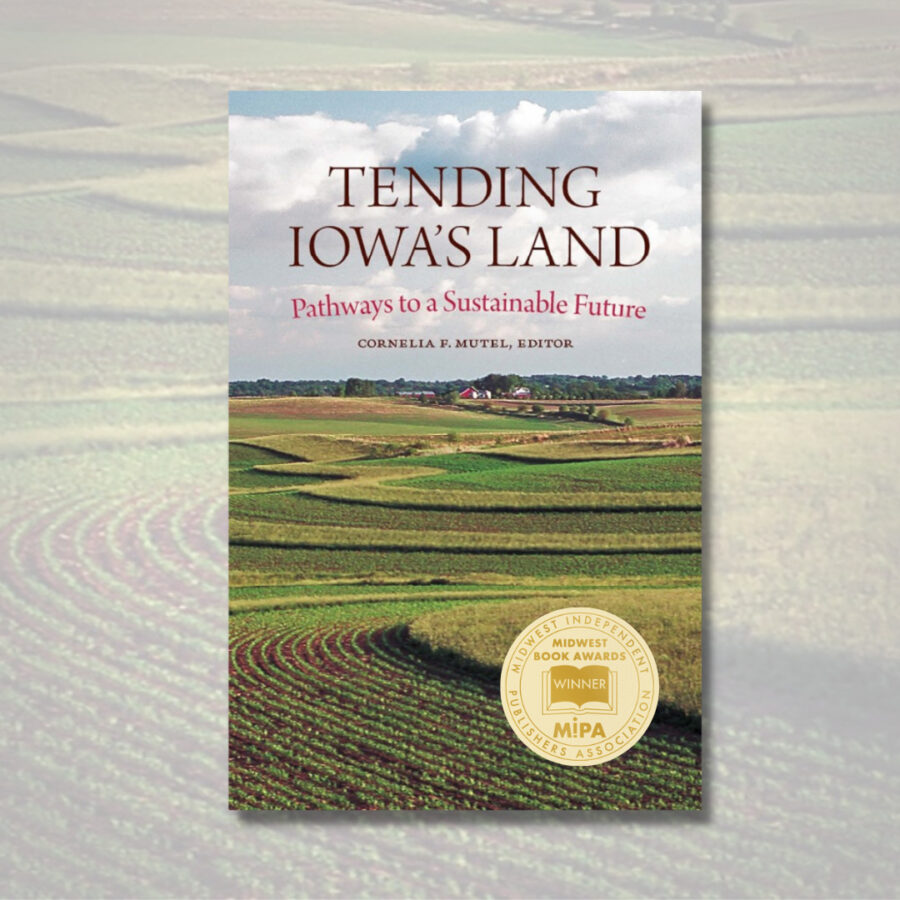Book Review: Tending Iowa’s Land, Pathways to a Sustainable Future
Written by Mitchell Griffin, this review originally appeared in the Fall/Winter 2023 issue of Bur Oak Notes.

Tending Iowa’s Land, a new series of essays composed by respected Iowa scientists and landowners and edited by Cornelia Mutel, is a beautiful yet painful collection of stories. Rich in both scientific scope and personal accounts, these essays detail how Iowa was transformed from a lush landscape covered in prairies and wetlands to one where human development has produced an emaciated state whose biodiversity and ecosystem resilience were crushed in the process.
Iowa’s former prairies once boasted one of the most brilliant and diverse ecosystems on the planet. Now, Iowans live within something akin to a 30 million-acre strip mine, a place where the once rich resources of the land are ripped away year after year by poor farming practices at the expense of everyone.
Mutel breaks her book into four respective sections: one for soil, water, air, and life. Each section contains essays by scientists and Iowa landowners (often farmers) that bring unique and, importantly, personal perspectives. In every essay, one can feel the passion of an Iowan who desperately wants to help foster a more sustainable future. These Iowans often reflect on how they have awe for the natural beauty left in the region, but a sense of despair at the great losses endured over the last century and a half, a feeling that pushes them to do all they can to foster a healthier future for the land.
Despite each of the essays being written by different authors, the collection is able to coherently emphasize the overlapping nature of the many desperate issues the state faces. If not understood beforehand, one would be hard-pressed to read these essays and not come away seeing clearly the interconnected issues of soil erosion, water quality, monoculture agriculture (including its heavy inputs of pesticides and fertilizers), and collapsed biodiversity.

Rather than simply lament the dire situation of Iowa’s landscape, the book embraces the challenge of outlining how Iowans can ameliorate the current damages. A cautious optimism pervades the essays, one that acknowledges the difficulty of our current problems while also outlining potential paths forward.
Whether this comes from a biologist on the team that embraced the massive, unprecedented restoration effort across nearly 9,000 acres on the Neal Smith
National Wildlife Refuge, from farmers who fight against convention to create
ecologically-sound farming and grazing operations, or the many groups that work to preserve Iowa’s few precious remnant prairies, the message that a path forward certainly exists is strong.
Public policy is one element that feels at times overlooked (though not
totally ignored) in Tending Iowa’s Land. On one level, this comes across as sensible. The book aims to tell stories of those Iowans who have taken it upon themselves to make changes in their own stewardship practices or embark on initiatives that harness collective power to improve various elements of Iowa’s natural resources, not to ignite a political crusade. And in a country where the policies enacted have very little correlation to popular will, essays like the ones featured in the book are even
more inspirational.
Iowans can do everything within their power to make positive changes without dipping their toes into the minutia of policy and still make great strides, but existing policies (and the corporate interest groups themselves which advocate for them) are still a major barrier to progress. The economic policies at both the state and federal levels create incentives for the current ecologically-disastrous system to keep on producing in the same manner.
How can we expect Iowa farmers to change their ways on a large scale if heavy government subsidies continue to help make corn and soybeans the most profitable crops to plant in the region? How can we expect change when property taxes for farmers are strongly linked to their soil’s capacity to produce high corn and soy yields, making it even more difficult to plant anything else and break even in the process? All of this is not to discredit Mutel’s collection in any way. Tending Iowa’s Land is able to tackle issues like pollution abatement and soil conservation in a highly compelling fashion, one that would be difficult to remotely imitate through a purely economic or political lens.
Moreover, the lack of focus on policy is its own message. The issues we face are far too serious to wait for our politicians to craft their own solutions. Iowans must take action to restore Iowa’s ecosystems whether or not there is support from Des Moines or D.C.
If you were to drink water from any of Iowa’s streams, a hospital stay might be in your near future. If you live too close to a confined animal feeding operation (the standing-room-only abominations that house thousands of animals at once), you’re liable to develop chronic respiratory issues. If you want to see the rich soil that the prairies cultivated over millennia, most of it has been washed away in the last century. The awesome abundance of the prairie died long ago in the field, and not long after died once again in the memory of native Iowans and early settlers as the march of time carried on.
The past certainly can’t be changed, but the future’s trajectory can. If our current unsustainable path is continued, the likely consequences are often too unsettling to consider. A focused, intentional, and sustainable path to the future like the one outlined in Tending Iowa’s Land is needed if any of us hope to continue calling Iowa home.
About the author:
Raised among the fields of southwest Iowa, Mitchell Griffin hails from tiny Treynor. He is a graduate of the University of Iowa. After completing his degree at UI, he helped research the effects of bur oak blight at Iowa’s Lakeside Laboratory. He formerly served as an AmeriCorps member at Bur Oak Land Trust and accepted a position with Sustainable Landscape Solutions upon completing his service term.



